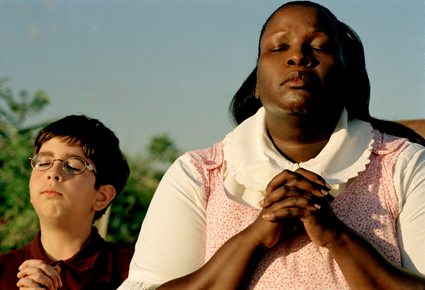|
Reviews of Recent Independent, Foreign, & Documentary Films in Theaters and DVD/Home Video
PALINDROMES
As a little girl, Aviva wants to have many babies so she'll always have
someone to love. A few years later, her wish comes true. (As in director
Todd Solondz's feature debut, Welcome to the Dollhouse, the sex is
utterly mechanical and joyless.) Teenage motherhood is the last thing mother
Joyce (Ellen Barkin) wants for her "one and only." Demanding her daughter
have an abortion, Joyce warns Aviva her baby could be born deformed and she'll then
be forced to live on food stamps. It soon becomes apparent why
Aviva has a void in her life. Barkin steadily devolves from a concerned,
bewildered parent to a narcissist without veering into caricature.
Clad in a belly shirt and tight jeans, Aviva runs away from home and
stowaways on a truck, which takes her to the rural Midwest. She befriends a
young boy, the preternaturally chipper Peter Paul (Alexander Brickel).
Through him, Aviva (now played by Sharon Wilkins) finds a "home of love and
faith" with a new maternal figure, Mama Sunshine. Living under her roof are
about a dozen children: blind Barbara, the mentally disabled Skippy ("like
the peanut butter"); and Ali, a former Muslim who has been "saved." Solondz
doesn't mock the children themselves, but their programmed message; their
enthusiasm is too infectious to ridicule as they perform as The Sunshine
Singers (think a multicultural Brady Bunch with a pro-life anthem, "You Got
to Fight for the Children.") Broadway veteran Debra Monk plays Mama Sunshine
without a shred of condescension; she has the best of intentions,
patiently raising a household of children with special needs. If there is a
villain it would be Aviva's mother and Mama Sunshine's husband, who
secretly plots to take the law into his own hands.
Solondz hits his target and then swiftly moves on to the next, whether he's
sending up Joyce's materialism or the evangelical subculture (Mama Sunshine
doesn't serve just ordinary cookies, they're "Jesus Tears"). As Aviva moves
from one extreme to another, the satire doesn't go over the top (even when
Peter Paul takes Aviva Dumpster-diving for discarded fetuses) thanks largely
to the cast. Instead, the succinct dialogue is delivered in a deadpan
manner, making the exchanges more piercing. The shell-shocked Avivas deliver
their lines almost like somnambulists.
Palindromes isn't so much about abortion, but a girl being thrown
from the frying pan into the fire. This pitch-black comedy is as pointed as
last year's Saved, but without a redeeming sermon. With his sense of
predestination, Solondz is like the Sam Shepard of the sterile suburban
strip malls. As one hapless middle-aged man, guilty of at least three
crimes, puts it, "How many times can I be born again?" Kent Turner
|
